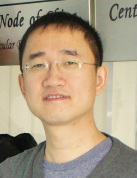
Cheng Li
Principal Investigator
Dr. Cheng Li studied computer science at Beijing Normal University (BS, 1995)
and statistics at University of California, Los Angeles (PhD, 2001).
He has worked at Harvard School of Public Health and Dana-Farber Cancer
Institute as an Assistant Professor since 2002 and Associate Professor since 2008 (Previous website).
He joined Peking University, School of Life Sciences in 2013.
Dr. Cheng Li’s group has developed many novel gene expression and SNP microarray analysis and visualization methods, and implemented and maintained highly-cited genomics analysis software such as dChip and ComBat. The long-term goal of his research is to contribute to personalized cancer medicine through statistical modeling of high-throughput genomic data. Specifically, 1) Develop rigorous statistical analysis models to accurately detect genomics alterations in cancer; 2) Develop statistical and computational models to identify novel cancer drug targets; 3) Collaborate closely with biologists and clinicians to validate candidate drug targets and achieve clinical relevance.
李程于1991至1995年就读于北京师范大学数学系计算机专业, 获得学士学位。1997至2001年在加州大学洛杉矶分校统计系师从美国科学院院士Wing H. Wong,获得统计学博士学位。期间开发的生物芯片底层分析模型 Li-Wong 模型 (Li and Wong 2001) 被引用3000次以上。2002至2013年在哈佛大学生物统计系、Dana- Farber Cancer Institute担任助理教授、副教授从事研究与教学工作。研究组开发的dChip软件 (几万行C++代码,近300项功能更新)、ComBat 等系列数据分析算法和软件被广泛应用于基因表达和SNP 生物芯片的数据分析和可视化,文章被引用4000余次。2013年4月开始在北京大学生命科学学院、生命科学联合中心、生物信息中心、统计科学中心工作。研究组的工作获得多项美国国家卫生院基金资助,在SCI刊物上发表学术论文97篇,包括以通讯作者在Leukemia, Nucleic Acids Research, Bioinformatics, BMC Genomics, PLoS Computational Biology, Plos One, Biostatistics等刊物发表的17篇论文。论文一共被引用20,000次以上,H-index为46。实验室使用生物、统计、计算等跨学科手段,提倡并培养研究人员和学生的科研锻炼与合作精神。多名承担过实验室项目的学生毕业后在美国知名大学任教,如 Sheng Zhong (UCSD,副教授)、Evan Johnson (Boston U,助理教授)。
研究问题
我们关心癌症形成和治疗中的重要问题。以基因组技术和生物信息为主要手段,和生物学家、临床医生紧密合作,产生基因组实验数据,使用统计和计算方法建立模型、提出生物假说,再用生物实验验证。目前的研究围绕“理解药物敏感性,发现新药物靶点”的主题,课题例子包括:调控细胞周期通路的小RNA网络,多发性骨髓癌中的非整倍体,网络元件在抗药性和敏感性中的作用。
实验室提供的资源
在统计、生物信息、癌症基因组学方面得到多种科研技能的锻炼与指导。
使用高性能计算集群进行大规模科学计算。
在每周的实验室组会和课题会上讨论研究进展,定期与美国哈佛大学、北京肿瘤医院、中科院上海生命科学院的合作组讨论课题。
参加北京大学生命科学学院、生物信息中心、统计科学中心的学术报告和交流活动。
选拔高年级研究生到美国知名大学合作者的实验室访问与交流,包括学校项目。
